Unconventional #1: The GOP’s veep problem, Cruz’s scheme to sink Trump in California, Sanders’ strange superdelegate shift (and more!)
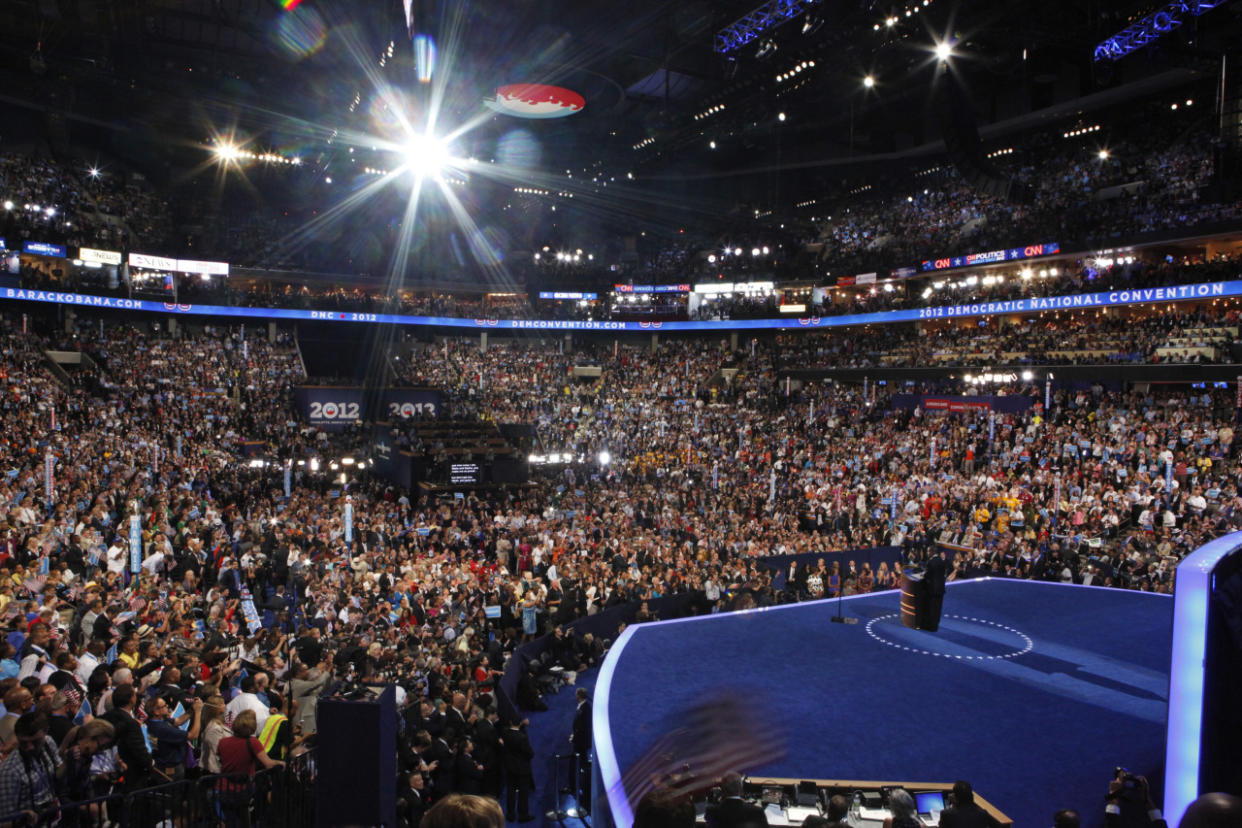
Photo: Larry Downing/Reuters
Unconventional is Yahoo News’ guide to the ins and outs of this year’s crazy presidential conventions. Here’s what you need to know today.
1. The GOP’s veep problem
The GOP’s 2016 “veepstakes” is likely to be weirder than anything we’ve seen before.
(For the full story, click here.)
In a normal presidential election year, the parties tend to coalesce around their nominees long before the conventions. That, in turn, gives each standard-bearer several months to select a running mate. It’s all very polite and predictable.
But 2016 is not a normal presidential election year — to put it mildly. If none of the candidates arrive at the convention in Cleveland with a majority of delegates (for the first time since 1984) and no candidate manages to cobble together a majority on the first ballot either (for the first time since 1952), it will means chaos, maneuvering and multiple rounds of presidential balloting — which in turn almost guarantees that the GOP’s 2016 vice presidential candidate will be chosen in one of five very odd ways.
The first would be the Premature Pick — that is, a VP pick made before the party even chooses its presidential nominee. This is exactly what Ronald Reagan did when he selected Richard Schweiker in 1976. The former California governor was neck and neck with incumbent President Gerald Ford at the time, and his hope was that Schweiker, a moderate U.S. senator from Pennsylvania, would soothe fears about his Western conservatism and flip some middle-of-the-road delegates. If Trump, Cruz or Kasich were to name a running mate prior to the convention, they’d be jumping the gun for similarly self-serving reasons: to curry favor with the delegates who will ultimately decide their fate.
The second, third and fourth scenarios would all unfold at the convention itself. There’s the Unity Ticket, in which the first- and second-place finishers band together for the good of the party. There’s the Rushed Running Mate: a new figure who joins the ticket either (a) during the balloting process in Cleveland, or (b) shortly after the nomination is decided on the floor of the convention hall. (Imagine the usual weeks-long rollout procedure, only this time compressed into the most hectic and pivotal hours of the entire 2016 GOP contest, when the candidates and their overextended advisers will not have had nearly as much time as earlier campaigns to consider their options and control the unveiling.) And it’s also possible that a majority of delegates could nominate the party’s 2016 veep candidate by themselves — no matter what the presidential candidates do, say or want. (Call it a Convention’s Choice).
“That’s a subject no one’s really talking about, is that [the VP pick] is another vote on the floor,” RNC Chair Reince Priebus has said. “There’s no first- and second-ballot binding. It’s just a free vote.”
Finally, the RNC rules committee could push for a Delayed Decision, revising its bylaws and deferring the final veep vote to a later date so that whoever emerges from Cleveland as the presidential nominee can take the time he needs to consider (and vet) his pick.
All these scenarios are politically risky. A Premature Pick could look presumptuous — the equivalent of Al Gore launching his transition effort before the courts had officially decided the 2000 election. It might also alienate other vice presidential hopefuls and their fans at the very moment you need all the support you can get, and it would certainly limit your leverage on the convention floor, where the vice presidency may be the only bargaining chip that can push you past the 1,237-delegate mark. In the antagonistic atmosphere of 2016, a unity ticket — especially Trump-Cruz — is unlikely to gel. A Rushed Running Mate could easily backfire (for lack of vetting) or hijack coverage at a time when the focus should be squarely on the candidate. A Convention’s Choice could highlight intraparty division; a Delayed Decision could be messy and confusing.
Even worse? The GOP’s wacky veepstakes “might damage the vice presidency itself,” according Joel K. Goldstein, a law professor at St. Louis University who specializes in vice presidential history. “We haven’t seen anything like this in the modern era.”
Want to know more? Read on.
ALSO: Drop me a line on Twitter (@andrewromano) and let me know who you think this year’s GOP veep candidate will be (and why). I’ll RT the best/funniest/most “unconventional” predictions.
_____
2. Now I Get It: What’s a contested convention?
You may think this primary season feels a little like Wrestlemania. But it’s likely to turn into an all-out cage match at the Republican National Convention in July. What happens if no one clinches the nomination before Cleveland? Yahoo Global News Anchor Katie Couric explains how a contested convention would work.
_____
3. Cruz’s scheme to sink Trump in California
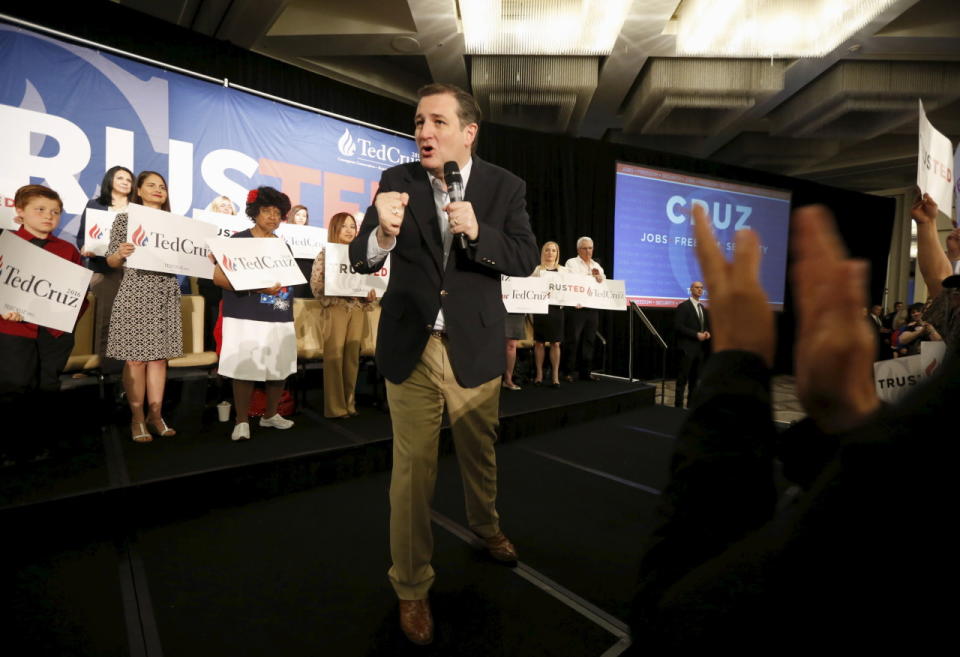
Republican presidential candidate Ted Cruz speaks during a campaign rally in Irvine, Calif., April 11, 2016. (Photo: Lucy Nicholson/Reuters)
As we saw in Colorado — and North Dakota, and Louisiana, and elsewhere — Team Cruz is much, much better than Team Trump at understanding and taking advantage of each state’s distinctive primary or caucus rules to maximize its delegate tally.
But in California — the last and largest primary on the calendar — Cruz’s strategic superiority won’t just help the Texan pick up a few extra delegates. It could actually prove to be the difference between Trump clinching the nomination outright or falling short at the 11th hour, which would trigger a contested convention.
No wonder Cruz took a break Monday from campaigning in New York to visit Irvine and San Diego on his most extensive Golden State swing to date.
“This is the birthplace of the Reagan revolution — and let me tell ya, there’s a new revolution brewing,” Cruz told thousands of supporters at the Hotel Irvine. “Just like in 1980, it’s gonna be California that’s gonna decide, California that’s gonna lead the way.”
This isn’t just idle chatter. To secure the nomination on June 7, Trump will have to win roughly 70 percent of California’s delegates. But the state’s primary is a little quirky — and all those quirks favor the senator from Texas.
To find out more, Unconventional sat down after the Irvine rally with Mike Schroeder, the former state GOP chairman who’s now serving as Cruz’s political director in California.
“This is the last stand,” Schroeder said. “This is the battleground. And I think we’re going to win California — but even if we don’t, Trump is not going to get to 70 percent of the vote.”
Why is Schroeder so confident? First of all, only Republicans can cast ballots on June 7. No independents or Democrats. That’s good for Cruz (who does best with conservatives) and bad for Trump (who does best with moderates).
Secondly, California is winner-take-all by congressional district (plus three unpledged delegates and an additional 10 that will be awarded to the statewide champ). Not only is this a boon for the most organized candidate; it also blunts the impact of expensive ad buys (contrary to the conventional wisdom about California campaigns).
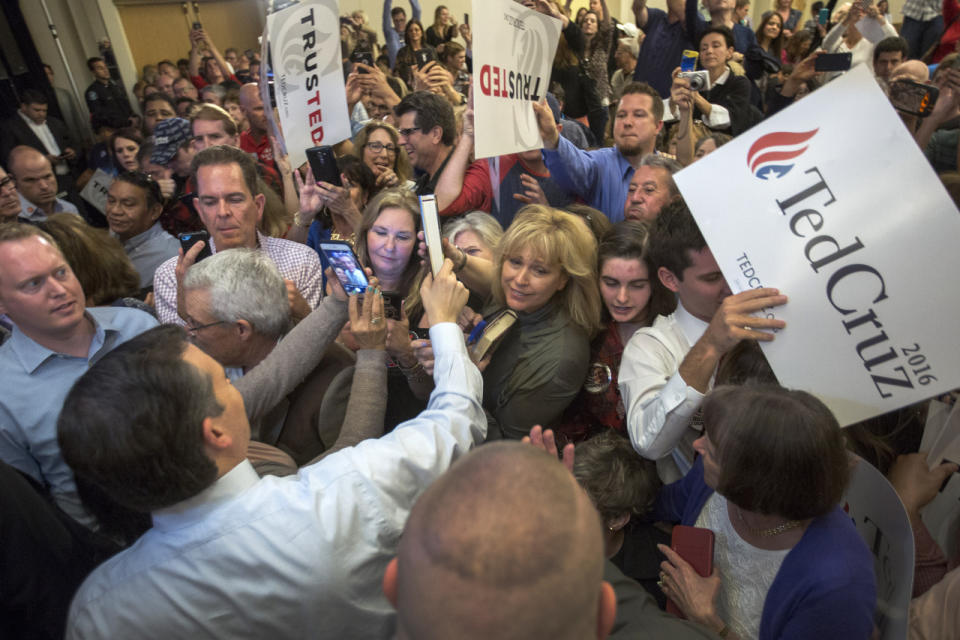
Republican presidential candidate Sen. Ted Cruz greets supporters at a campaign rally on April 11, 2016, in Irvine, Calif. (Photo: David McNew/Getty Images)
“It requires a great deal more organization to conduct 53 elections than it does to conduct one statewide and just buy a lot of TV,” Schroeder said. “This is very blue state. So we’ll have some districts with only 5,000 Republican voters. I call them ‘empty districts’: maybe 2,000 voters will decide the result. That’s not even a good-size city council race. And yet you still get the same number of delegates — three — that you would in a district with 240,000 Republicans.”
The Cruz campaign has been organizing in California for a year. They have thousands of volunteers statewide. And an estimated 65 percent of primary participants are expected to vote early by mail — a process that begins in three weeks. “We’re going to talk to all of these people personally,” Schroeder said. “We can pour calls into those empty districts.”
Also helping Cruz is the fact that the campaigns have to pick their own delegates — 169 of them, plus 169 alternates. The process of identifying six committed Cruz supporters in every single congressional district — including districts where Republicans haven’t really campaigned in decades — wasn’t easy. It took Schroeder five months. But now he’s finished — and the Trump campaign, which just hired a state political director today, is only getting started.
“It’s been a huge project for me,” Schroeder said. “And they have to file all of those names with the secretary of state on May 7? That’s less than a month from now. If you don’t have those names by May 7, even if you win that district, you don’t get any delegates.”
On Monday, Trump convention manager Paul Manafort accused the Cruz campaign of using “Gestapo tactics” to earn delegate support. Schroeder chuckled when he heard that.
“These are the rules,” Schroeder said. “They’re pretty simple. Follow them. Get over it. Stop whining.”
In California, Schroeder and the rest of Team Cruz could have the last laugh.
_____
4. Sanders’ strange superdelegate shift
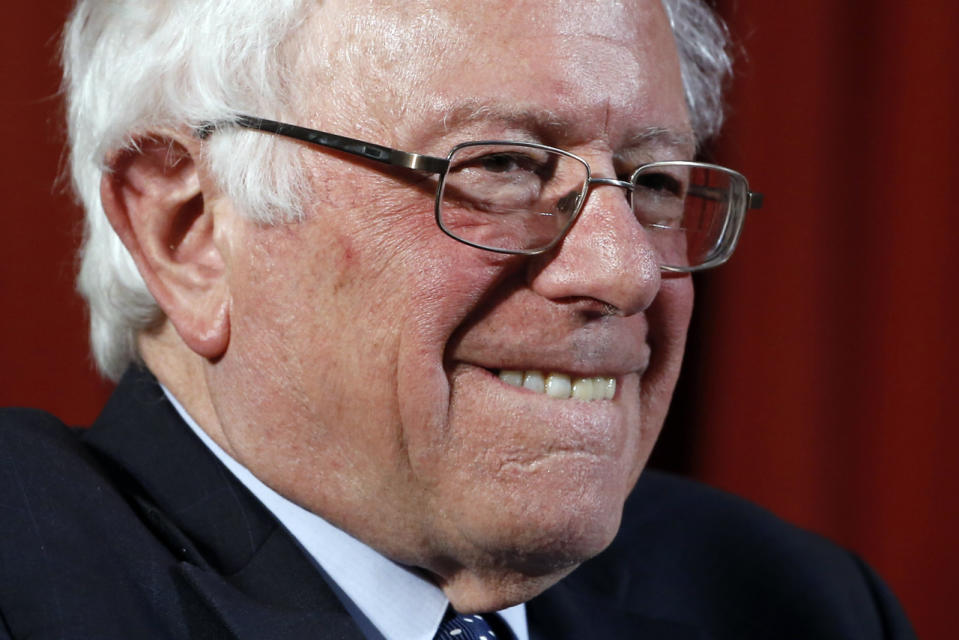
Democratic presidential candidate Sen. Bernie Sanders smiles during a campaign stop Wednesday, April 6, 2016, at Tindley Temple United Methodist Church in Philadelphia. (Photo: Matt Rourke/AP)
For months, Bernie Sanders’ allies have been arguing that the Democratic Party’s superdelegates — who can vote for whomever they want at the convention — should not go against “the will of the people” and should instead back the candidate who won the most pledged delegates in their state. But now the Sanders campaign is singing a different tune, according to Yahoo News Senior National Affairs Reporter Liz Goodwin:
Even as Bernie’s supporters continue to inundate superdelegates with their anti-elitist arguments, Sanders and his top campaign officials are now arguing that superdelegates should back Bernie even in states where he didn’t win — and even if he doesn’t win a majority of the popular votes cast.
Is Bernie trying to have his cake and eat it too? Weigh in on Facebook.
_____

5. The best of the rest
“When it comes to getting delegates, it is the wild, wild West. Anything goes.” https://t.co/KtQoo7DDli
— Ed O'Keefe (@edatpost)
GOP could be headed to situation in which popular vote loser wins nomination. https://t.co/tkczKxntei
— Byron York (@ByronYork)
Conventions once decided the nominee–can or should they do it again? My POLITICO column. https://t.co/PYfRKNRBOQ
— Jeff Greenfield (@greenfield64)
Scenes from a Political Revolution, Colorado Style https://t.co/zdiiyjGWjJ via @NRO
— John Fund (@johnfund)
My new @WashingtonPost column: What Trump can learn from Reagan and the ’76 delegate fight https://t.co/HRxPDIdqSC
— Marc Thiessen (@marcthiessen)
New: Why Bernie Sanders Is Even Less Competitive than He Appears https://t.co/11bimy3sUw @FiveThirtyEight @CookPolitical
— Dave Wasserman (@Redistrict)
_____
History lesson
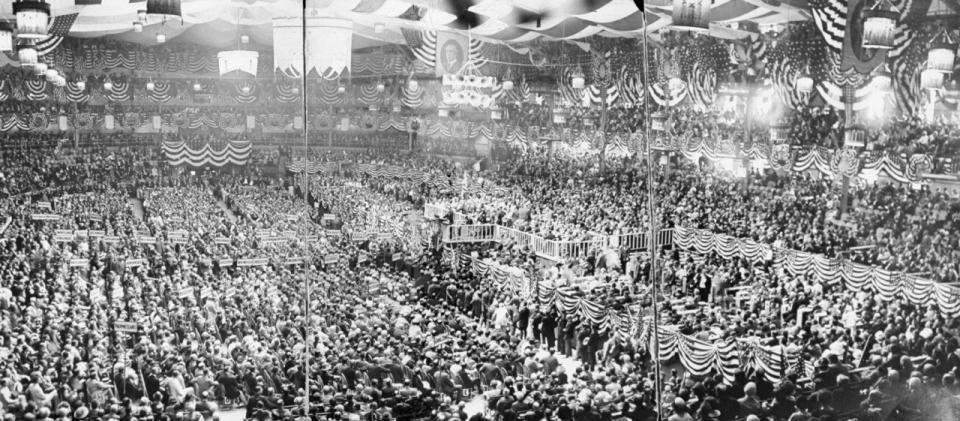
General view of the 1924 Democratic National Convention in Madison Square Garden in NYC. (Photo: NY Daily News Archive via Getty Images)
The 1924 Democratic National Convention, held at New York City’s Madison Square Garden from June 24 to July 9, 1924, took 103 ballots to nominate a presidential candidate. Can the GOP beat that record in Cleveland? Stay tuned…
_____
Countdown
For the latest data, make sure to check the Yahoo News delegate scorecard and primary calendar.
_____



